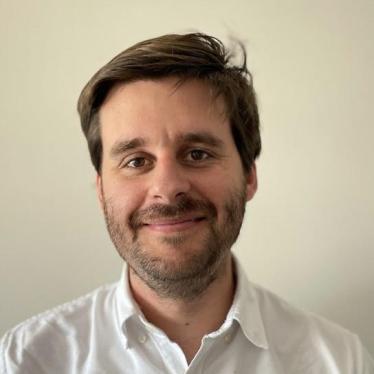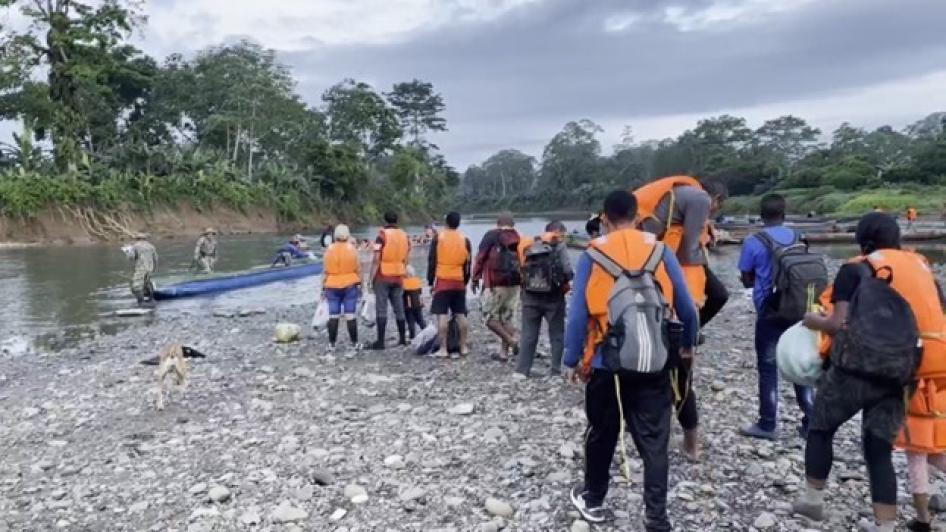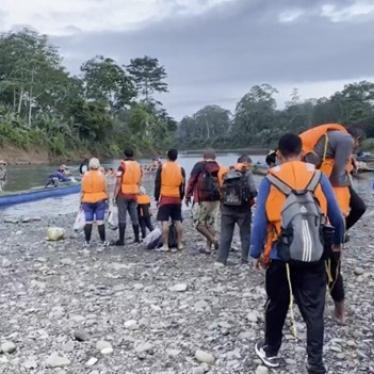A 37-year-old Haitian woman lay on a wooden table in the Panamanian side of the Darien Gap, a jungle on the Colombia-Panama border. Her 3-year-old son shivered next to her. Several Cuban doctors, who were also crossing the border, helped her deliver her baby with improvised medical supplies, as prosecutors and border patrol agents watched from a distance. There were no French interpreters, so one of my Human Rights Watch colleagues helped.
After walking for days across the Darien Gap, the woman had arrived in Canaán Membrillo, an Indigenous community where people crossing the border first encounter Panamanian immigration authorities. Her life was at risk. Doctors used the elastic from facemasks to cut the umbilical cord. She survived, but doctors said her fetus had been dead for days. At the doctors’ insistence, border patrol agents sent her to the closest hospital—a five-hour boat trip in the middle of the night.
She was among 100,000 people who crossed the Darien gap between January and August —the highest figure ever recorded during these months. When we visited the border in May, we saw hundreds of people, including children and pregnant women in need of medical assistance, taking this dangerous route. After walking for days, many arrived dehydrated, with sores, serious mosquito bites, and swollen ankles. Many had been assaulted by gangs, who robbed and threatened them and, in dozens of cases, sexually abused them.
But, when we visited, there were no government doctors to assist them when they arrived in Panama. Patrol agents mostly relied on Cuban migrants with medical training. There is a public health center in Canaán Membrillo, and it was recently refurbished. But it had no medical supplies or medical staff.
After crossing the border, people are taken by border patrol agents to a migrant detention center called San Vicente, five hours away. There, they receive medical attention from Médecins Sans Frontières (Doctors without Borders or MSF) and the Panamanian Red Cross, but these organizations are struggling to cope. Between April 2021 and May 2022, MSF provided medical and psychological assistance to 417 women who suffered sexual abuse in the Darien Gap.
When we visited San Vicente, we found dirty tents in poor conditions. People slept on the floor. The bathrooms were unsanitary and did not allow separation between the sexes. There was limited screening for asylum.
From San Vicente, Panamanian authorities then send people north in buses, to the Planes de Gualaca migrant reception center at the border with Costa Rica. There, they sleep in run-down wooden houses with dirty mattresses and no electricity. They receive no medical attention and, when we visited, there were no government officials screening for asylum.
After the visit to the Colombia-Panama border, we raised the lack of medical attention with government authorities in Panama City, including the deputy minister of health. Shortly afterward, the Health Ministry posted one doctor, one nurse, and one assistant in Canaán Membrillo, as Panama’s Ombudsperson’s Office had long been urging.
This is certainly a step in the right direction and one that will bring relief to many people. But it is only one of many steps that need to be taken by Colombian and Panamanian authorities and other governments in the region, including the Biden administration in the United States.
New visa requirements by several countries in the Americas, including Mexico, have led to a significant increase in the number of Venezuelans and others crossing the Darien Gap because they cannot fly to those countries directly. Some governments appear to have imposed these new immigration restrictions in response to pressure from the United States.
Almost 69,000 Venezuelans have crossed the Gap between January and August this year— 60 times as many as last year. They have surpassed Cubans and Haitians as the largest national group making the crossing. Many told us this was the only route available to them.
Governments in the region should urgently reverse measures that effectively prevent access to asylum and force people into dangerous crossings where they are exposed to grave abuses.
But while they do, Panamanian authorities should do more to ensure that migrants and local communities receive adequate assistance, including medical attention.
Panamanian authorities should ensure that the newly placed medical team, which only works on weekdays, expands its coverage and has sufficient medicines and supplies to provide quality health care to migrants and locals. They should also work with MSF, the Panamanian Red Cross, and other nongovernmental organizations so that they can expand their presence in Canaán Membrillo. Prompt medical attention, especially for people who have suffered sexual abuse, is critically important to protect their life and health.
The Panamanian government should also improve conditions in reception centers near their southern and northern borders. In doing so, they should take into account advice from humanitarian groups working in the area, improve the facilities, and establish provide permanent assistance from government doctors, asylum officials, and childcare agencies.
Tens of thousands of migrants are fleeing human rights crises in the Americas through the Darien Gap. They deserve a safe, orderly, and dignified way to seek protection abroad.









